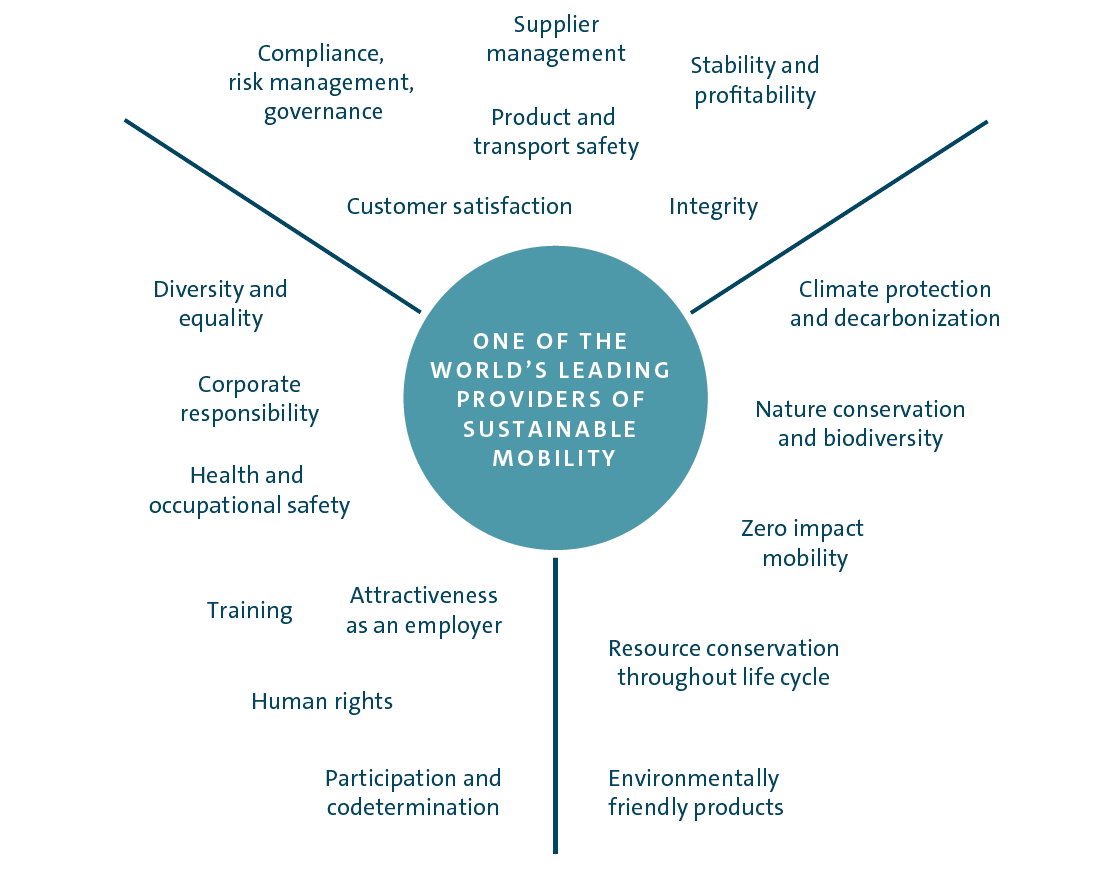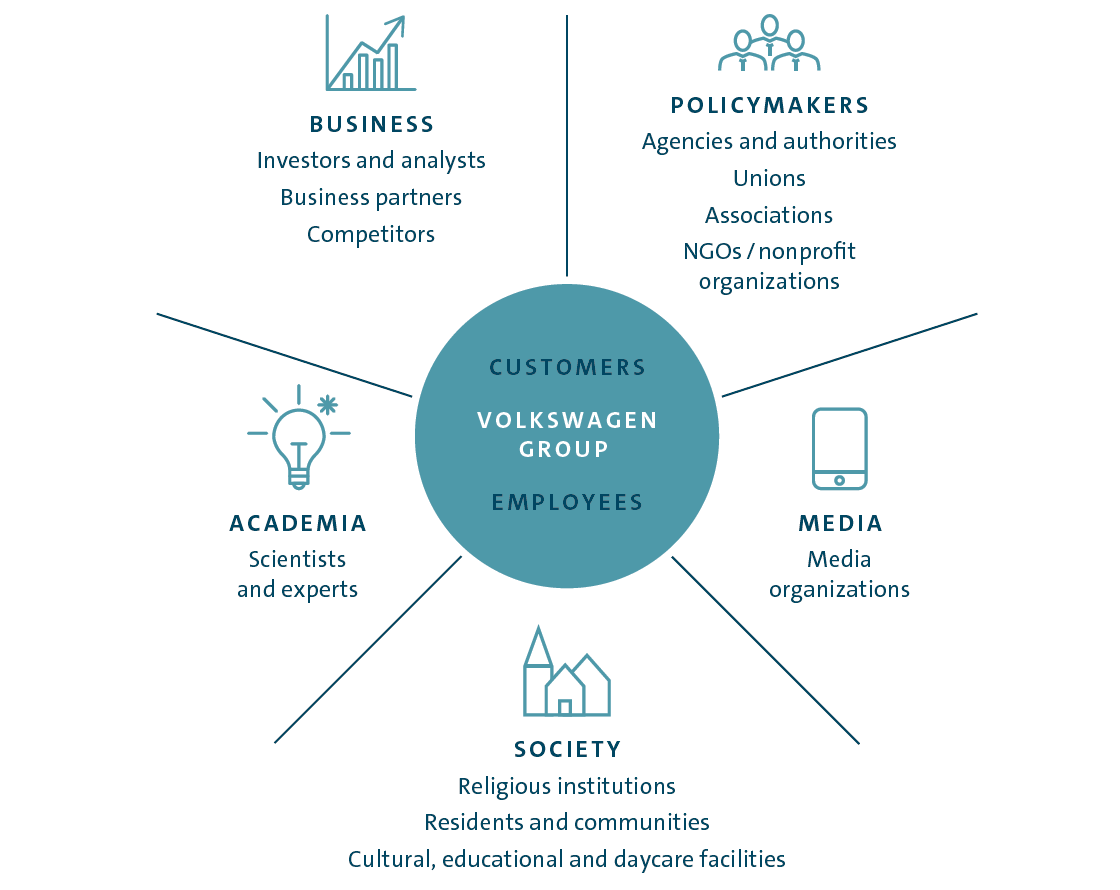Sustainability
The Volkswagen Group is committed to sustainable, transparent and responsible corporate governance. The biggest challenge we face in implementing this at all levels and at every step in the value chain is the complexity of our Company, with its twelve brands, more than 642 thousand employees and 120 production locations. In order to tackle this challenge in the best way possible, we follow the Sustainable Development Goals (SDGs) formulated by the United Nations and the recommendations of the German Corporate Governance Code. In addition, we coordinate our sustainability activities across the entire Group. We have also put in place a forward-looking system of risk management and a clear framework for dealing with environmental issues in a future-oriented manner, for employee responsibility and for social commitment across our brands and in the regions in which we operate.
For us, sustainability means simultaneously striving for economic, social and environmental goals in a way that gives them equal priority. The future program TOGETHER – Strategy 2025 places sustainable growth at the heart of our strategic target dimensions: we want to be an excellent employer and a role model for the environment, safety and integrity, to excite customers and to ensure that we achieve competitive profitability. By 2025, we aim to make the Volkswagen Group the world’s number one in e-mobility. We will therefore set new priorities with Roadmap E. We also want to ensure that we recognize opportunities and risks in the areas of environment, society and governance at an early stage at every step along the value chain. Our corporate social responsibility (CSR) activities will contribute toward enhancing our Company’s reputation and value in the long term.
Management and Coordination
The Volkswagen Group has created a clear management structure to coordinate the Group’s activities as regards sustainability and CSR. Its highest committee is the Group Board of Management, which acts as the Sustainability Board at the same time. It is regularly briefed by the Group Sustainability steering group on issues related to the topics of sustainability and corporate responsibility. The members of the Group Sustainability steering group include executives from central Board of Management business areas and representatives of the Group Works Council and the brands. The steering group’s tasks include identifying the key action areas, making decisions on the strategic sustainability goals, monitoring by means of indicators the extent to which these goals are being met and approving the sustainability report.
The sustainability office supports the steering group. Its duties include coordinating all sustainability activities within the Group and the brands. It is also responsible for stakeholder dialog at Group level, for example with sustainability-driven analysts and investors. In addition, CSR project teams work across business areas on topics such as reporting, stakeholder management and sustainability in supplier relationships. This coordination and working structure is also largely established across the brands and is constantly expanding. Since 2009, the Sustainability & CSR coordinators for all brands and regions have come together once a year to promote communication across the Group, create uniform structures and learn from one another. This Group CSR meeting has proven its worth as an integral part of the Group-wide coordination structure.
Sustainability Council
As part of its efforts to continuously improve and expand its sustainability management, the Volkswagen Group appointed an international Sustainability Council in 2016 made up of renowned experts from the academic world, politics and society. The members of the council establish their own working methods and areas of focus independently and consult with the Board of Management, senior managers and the employee representatives regularly for the purposes of consultation, exchanging information and initiating action.
The key issues in 2017 were the challenges created by global CO2 emissions and the regulatory requirements to be met post-2025, as well as the Company’s transformation process. The Volkswagen Group is initially providing €20 million in funding for projects proposed and promoted by the Sustainability Council for the years 2017 and 2018. The first projects relate to innovation and cultural change in the area of sustainable mobility, an international crisis prevention initiative as a result of climate change and an academic study on the future shape of the transport and climate policy framework.
VOLKSWAGEN GROUP’S KEY ACTION AREAS

Materiality analysis
Two developments in 2017 continued to influence the detailed analysis as to which issues are material to the Volkswagen Group: the realignment of the Group via the future program TOGETHER – Strategy 2025, and dealing with the consequences of the diesel issue.
After analyzing and identifying topics that are material to the Company, we derived 18 key action areas that we will use to achieve our goal of being one of the world’s leading providers of sustainable mobility. The analysis was based on external studies, industry analyses and stakeholder surveys carried out by our brands, internal guidelines such as our corporate strategy and Group environmental strategy, and key factors identified by the Volkswagen Group’s strategy committee.
As the details of the new Group strategy have not yet been finalized, we are still in the process of specifying the content of the key action areas and defining corresponding values, targets and indicators. As an enterprise with global operations, we also take account of the options available to us for influencing and implementing the SDGs formulated by the United Nations.
Principles and guidelines
Voluntary commitments and principles that apply throughout the Group form the basis and backbone of our strategic sustainability goals. In addition, our sustainability model provides the framework for sustainable and responsible action. The Volkswagen Group’s revised Code of Conduct published in 2017 applies to the entire Group and helps managers and employees alike to deal with legal and ethical challenges in their day-to-day work.
We expressly support the United Nations Global Compact, an agreement between the UN and the business world aimed at enhancing the social and ecological aspects of globalization. As long ago as 2002, the Volkswagen Group made a commitment to promoting human rights, labor standards, environmental protection and combating corruption. In 2013, this commitment was extended to include the so-called CEO Water Mandate, the aim of which is to ensure the careful management of water resources. Since the emergence of the diesel issue, we have agreed on a temporary suspension of our membership. Our objective is to ensure that our actions are in line with the declarations of the International Labor Organization (ILO), the principles and conventions of the Organisation for Economic Co-operation and Development (OECD) and the international covenants of the United Nations on basic rights and freedom.
We have also established our own internal guidelines in the shape of the Volkswagen Social Charter, the Charter on Labor Relations, the Charter on Vocational Education and Training, and the Charter on Temporary Work, all of which apply to the Group as a whole. Environmental protection activities are shaped both by the environmental policy and by the principles for products and production, which apply throughout the Group.
Strategic stakeholder management
Our stakeholders are individuals, groups, or organizations who materially influence or are influenced by the way in which the Group reaches its corporate decisions and the implications of those decisions. The role of stakeholder management is to manage the many demands placed upon us such that the Group can integrate them into its decision-making processes. This includes sharing knowledge, jointly developing solutions for the problems we face and using transparent criteria to make decisions.
STAKEHOLDERS OF THE VOLKSWAGEN GROUP

Our customers and our employees are our key stakeholders. Around this core, we have defined twelve types of stakeholders in five clusters. This classification is the product of a stakeholder assessment in which we regularly identify the Group’s key stakeholder groups.
The aim is to open up decision-making processes and systematically enhance the Group’s sustainability management through constructive criticism. In this context, we take a holistic approach to stakeholder management.